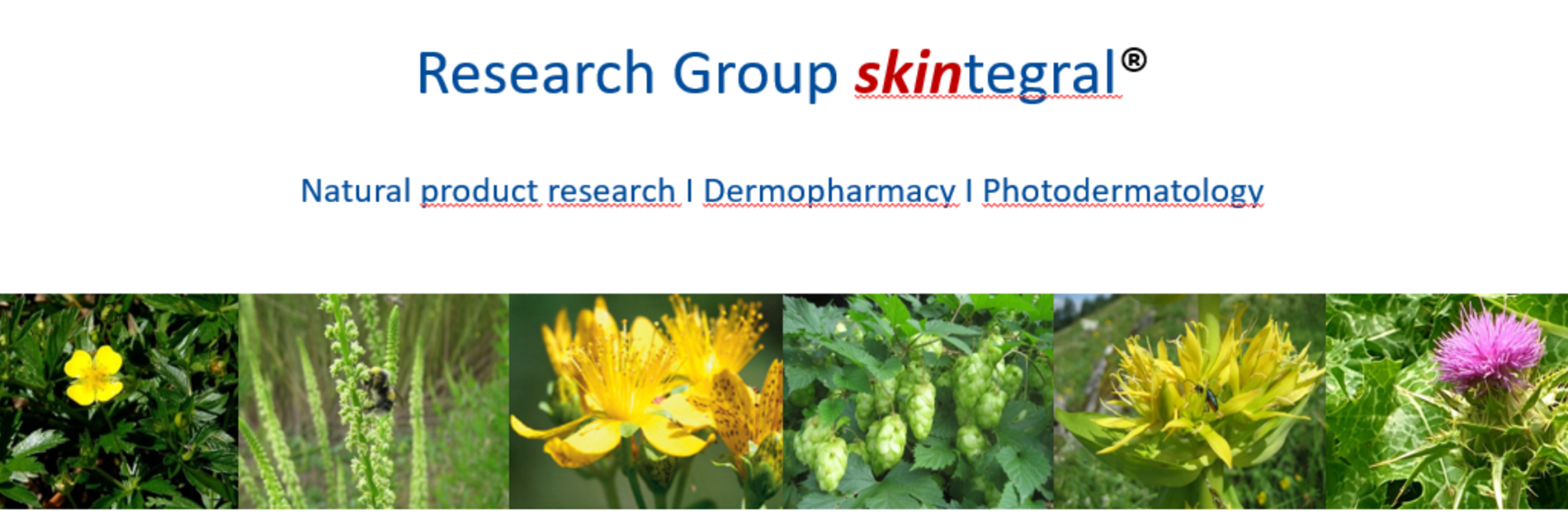
Prof. Dr. med. Dipl. Biol. Christoph M. Schempp (Head)
Telefon: 0761-270-67010
Telefax: 0761-270-68290

Prof. Dr. rer. nat. Ute Wölfle (Cellular and molecular biologist, lab leader)
Telefon: 0761-270-67010
E-Mail: ute.woelfle[at]uniklinik-freiburg.de
ORCID iD 0000-0003-0093-560X


Zita Hurth (MD student)

Marie-Luise Faber (MD student)
Research activities of skintegral™ are dedicated to investigating beneficial effect of plant extracts, minerals and solar light on the skin. Plant extracts contain a variety of natural compounds with therapeutic relevance, such as free radical scavenging, anti-inflammatory and antimicrobial effects. The dermatologic usability of most of these compounds is only partly explored.
The efficacy and skin tolerability of natural compounds in topical preparations depends on the liberation and penetration of the compounds from the vehicle, a scientific field covered by dermopharmacy. Natural substances used in dermatology should not have any sensitizing or phototoxic potential. To adress this, various cell culture models and molecular methods are established in our laboratory. Clinically, the substances are investigated in skin tests such as the patch test or the ultraviolet erythema test. The spectrum of methods includes bioengeneering methods such as the measurement of skin hydration, transepidermal water loss, skin perfusion and sebumetry.
Influencing the interaction of psoriasis keratinocytes and fatty liver cells by liver remedies of the integrative medicine (PSORI-HEP study)
Funded by the Sanddorf Foundation and Software AG Foundation
Psoriasis is a noncommunicable, partly genetically determined, chronic inflammatory skin disease associated with several comorbidities. One of the most common comorbidity is the metabolic syndrome that include obesity, diabetes mellitus, elevated liver enzymes and metabolic dysfunction-associated fatty liver disease (MAFLD). The research project investigates the association of psoriasis with MAFLD using several experimental models. The main question is whether treatment of fatty liver cells with liver therapeutics or complex gastrointestinal-liver-bile remedies can improve the expression of psoriasis inflammation.

Network between adipose tissue, liver and skin (modified from Mantovani et al. IJMS 2016; Heitmann et al. JDDG, 2021) MAFLD: metabolic dysfunction-associated fatty liver disease; MASH: metabolic dysfunction-associated steatohepatitis
Effect of antimony and antimonite on psoriasis keratinocytes.
Supported by Christophorus Foundation, DAMUS-DONATA e.V., Dr. Hauschka Foundation, Mahle Foundation, Rudolf Steiner Fund and WELEDA AG.

Antimonite crystal (Photo: State Museum of Natural History Karlsruhe)
Antimony (Stibium, Sb) and Antimonite (Stibnite, Sb2S3) are metalloids with anti-infective and immunosuppressive properties. They have been used as remedies for a long time, but in recent times they are only used restrictively to treat certain parasitoses due to their toxicity. Antimony and antimonite are also used in anthroposophic medicine in diluted nontoxic preparations. In this research project, dose-response relationships and active principles of antimony, antimonite and the antimony compound Tartarus stibiatus were investigated on psoriasis-like keratinocytes. It was shown that antimony / antimonite - but especially Tartarus stibiatus - causes a reduction in keratinocyte proliferation and a reduction in psoriatic inflammation.
Effect of botanical compounds on psoriasis keratinocytes ‚in vitro' and ‚in vivo'
Funded by the Wilhelm Doerenkamp Foundation, Chur (Switzerland)
In this project, the anti-psoriatic effect of traditionally used and novel botanical compounds was investigated. Of particular interest are active plant compounds from Centella asiatica (asiatic pennywort with madecassoids and asiaticosides), Mahonia aquifolium (mahonia with berberine), Curcuma amada (mango ginger with the diterpenoid LDD) and Whrightia tinctoria (sweet indraja with triterpenes and sterols), as they have been used in Ayurvedic and traditional Chinese medicine for thousands of years to treat skin diseases. In addition, the traditional medicinal plants from occidental monastic medicine Hypericum perforatum (St. John's wort with hyperforin) and Humulus lupulus (hops with humulone and lupulone) could be effective. After screening the botanical compounds for anti-inflammatory and anti-proliferative effects, hops and St. John's wort were found to be particularly promising botanical compounds in psoriasis models in vitro and ex vivo.

Physiological role of bitter taste receptors in the skin
In recent years, it has been discovered that certain taste receptors, the bitter taste receptors (TAS2Rs), are not only present on the tongue and upper gastrointestinal tract, but also on the bronchi of the lung. The binding of bitter substances to TA2Rs in the lung induces bronchodilation. This may be of therapeutic use in the treatment of asthma bronchiale. The research unit skintegral could show that the skin also possesses bitter taste receptors.
Plant derived bitter agents from gentian (amarogentin) or willow bark (salicin) bind to these bitter taste receptors and induce calcium influx into keratinocytes. This leads to the synthesis of lipids and proteins that are crucial for the formation of the skin barrier (e.g. keratins, filaggrin). Bitter substances thus stimulate the skin's metabolism. In addition, they have anti-allergic effects.

UV-protective and anti-inflammatory effect of polyphenols
The anti-inflammatory effect of the ellagitannins of the bloodroot (Potentilla erecta) is comparable to the effect of hydrocortisone in vitro and in vivo. We studied a concentrated bloodroot extract, that showed vasoconstriction on the skin, similar to hydrocortisone, but without activating the glucocorticoid receptor.
The flavonoid luteolin e.g. from the dyer plant Reseda luteola is one of the most effective anti-oxidative polyphenols, which also has a DNA-protective effect.
The integrative approach of our research area is highlighted by interdisciplinary research projects with phytotherapy, allergology, biology, pharmacy and complementary medicine.
In particular, there are collaborations with:
- Prof. Dr. rer. nat. Stefan Martin und Dr. rer. nat. Philipp Esser, Allergy Research Group (ARG), University Medical Center, Freiburg
- Prof. Dr. med Tobias Böttler; Dr. Giuseppe Rusignuolo, Department of Medicine II, University Medical Center, Freiburg
- Dr. rer. nat. Karl Quirin und Anja Cawelius, Naturextrakte GmbH, Rehlingen
- Prof. Dr. med. Roman Huber, Center for Complementary Medicine, University Medical Center, Freiburg
- PD Dr. Dr. rer. nat. Franck A. Ditengou , Bio Imaging Core Light Microscopy (BiMiC), University Medical Center Freiburg
- Prof. Dr. rer. nat. Kateřina Vávrová, Faculty of Pharmacy Hradec Kralove, Charles University, CZE
- Dr. rer. nat. Martin Holzer Department of Pharmaceutical Technology and Biopharmacy, University Freiburg
- Prof. Dr. rer. nat. Ralf Weißenkirchen, Institute of Molecular Pathobiochemistry, RWTH University Hospital Aachen
- Prof. Dr. med Martin Wabitsch, Division of Paediatric Endocrinology and Diabetes, University Medical Centre, Ulm
- Dr. rer. nat. Kay Schwabe, Beauty Science Intelligent GmbH, Langenhagen
- Prof. Dr. Dr.-Ing. Jürgen Lademann und Prof. Dr. rer. nat. Martina Meinke, Center of Experimental and Applied Cutaneaous Physiology, Charité Berlin
2023
Human Advanced In Vitro Model Initiative (HUMAIN) Award from the organization PCRM (Physicians Committee for Responsible Medicine) and the company InSphero for 3D in vitro technology for Prof. Dr. Ute Wölfle
2018
Innovation Award of the Society for Phytotherapy for Prof. Schempp and PD Dr. Wölfle for their scientific work on the bitter substance receptors of the skin and the development of a medical skin care product based on this work
2017
Promega Prize for Dr. Ute Wölfle for science journalism "Hauptsache Biologie" together with the journalist Hans Joachim Kugler for the publication in the Badische Zeitung "Bitter helps you to think".
2011
Poster prize for the poster "UVB-induced DNA damage, generation of reactive oxygen species and inflammation is effectively attenuated by the flavonoid luteolin in vitro and in vivo" for Ute Wölfle at the annual meeting of the Society for Dermopharmacy
Prof. Dr. med Christoph Schempp and Prof. Dr. Ute Wölfle are inventors of the European patent „Bitter taste receptor agonists for topical use“ (EP 2 865 421 B1)
Klinik für Dermatologie und Venerologie
Hauptstraße 7
79104 Freiburg
Telefon: 0761 270-67010
Telefax: 0761 270-68290


